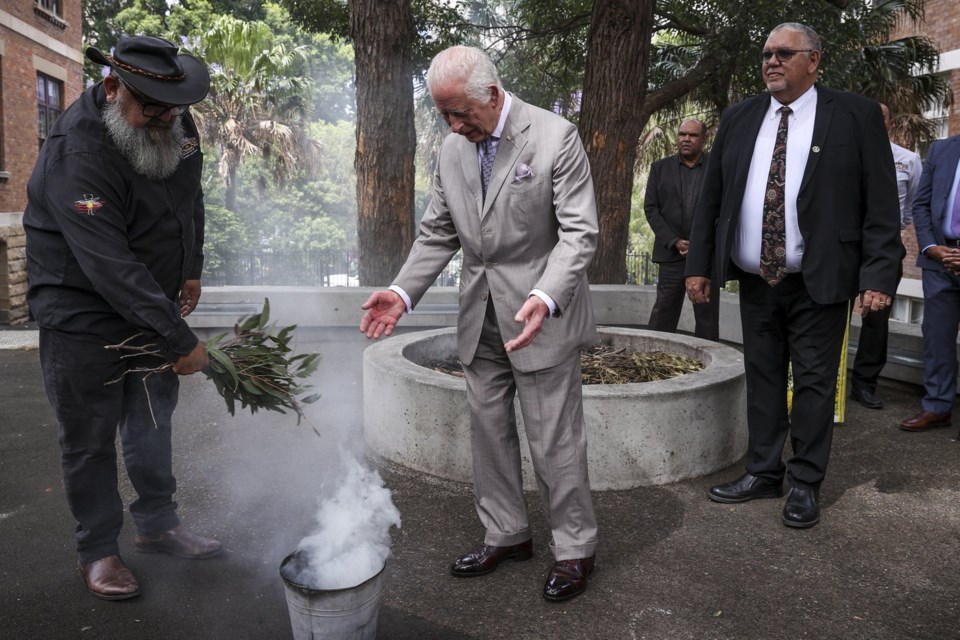MELBOURNE, Australia (AP) — King Charles III ends the first visit to Australia by a reigning British monarch in 13 years Tuesday with anti-monarchists hoping his journey is a step toward an Australian citizen becoming head of state.
Controversy interrupted the visit on Monday when Indigenous independent senator Lidia Thorpe yelled at Charles during a reception that he was not her king and Australia was not his land.
Esther Anatolitis, co-chair of the Australian Republic Movement, that campaigns for an Australian citizen to replace the British monarch as Australia’s head of state, said while thousands turned out to see the king and Queen Camilla at their public engagements, the numbers were larger when his mother Queen Elizabeth II first visited Australia 70 years ago.
An estimated 75% of Australia’s population saw the queen in person during the first visit by a reigning British monarch in 1954.
“It’s understandable that Australians would be welcoming the king and queen, we also welcome them,” Anatolitis said. “But it doesn’t make any sense to continue to have a head of state appointed by birth right from another country.”
Anatolitis acknowledged that getting a majority of Australians in a majority of states to vote to change the constitution would be difficult. Australians haven’t changed their constitution since 1977.
“It’s tricky, isn’t it? We’ve got that hurdle, of course,” Anatolitis said.
Constitutional lawyer Anne Twomey said an Australian republic was not something that Charles, 75, need worry about in his lifetime.
She said the failure of a referendum last year to create an “utterly innocuous” Indigenous representative body to advise government demonstrated the difficulty in changing Australia’s constitution.
“It’s just that on the whole people aren’t prepared to change the constitution,” Twomey said.
“So a republic, which would be a much more complex constitutional question than the one last year, would be far more vulnerable to a scare campaign and to opposition,” she said.
“So unless you had absolutely unanimous support across the board and a strong reason for doing it, it would fail,” she added.
Philip Benwell, national chair of the Australian Monarchist League, which wants to maintain Australia’s constitutional link to Britain, said he was standing near Thorpe at the Canberra reception when she started yelling at the king and demanding a treaty with Indigenous Australians.
“I think she alienated a lot of sympathy. If anything, she’s helped to strengthen our support,” Benwell said.
Thorpe has been criticized, including by some Indigenous leaders, for shouting at the king and failing to show respect.
Thorpe was unrepentant. She rejected criticism that her aggressive approach toward the monarch was violent.
“I think what was unacceptable is the violence in that room, of the King of England praising himself, dripping in stolen wealth, that’s what’s violent,” Thorpe told Australian Broadcasting Corp. “The violence is from the colonizer being in that room asserting his authority, being paid for by every taxpayer in this country.”
Australian Prime Minister Anthony Albanese wants Australia to become a republic but has ruled out a referendum during his first three-year term. But a referendum remains a possibility if his center-left Labor Party wins elections due by May next year.
Australians decided in a referendum in 1999 to retain Queen Elizabeth II as head of state. That result is widely regarded to have been the consequence of disagreement about how a president would be chosen rather than majority support for a monarch.
Sydney University royal historian Cindy McCreery suspects Australia is not yet ready to make the change.
“There's interest in becoming a republic, but I think what we may forget is that logistically speaking we're not going to have a referendum on that issue any time soon," McCreery said.
“I, as a historian, think that it's probably not realistic to expect a successful referendum on a republic until we've done more work on acknowledging our ... complicated history,” she said.
“Becoming a republic doesn't mean that we've somehow thrown off British colonialism. It hopefully has meant that we're engaging with our own history in an honest and thoughtful way,” she added.
Charles's trip to Australia was scaled down because he is undergoing cancer treatment. He arrives in Samoa on Wednesday.
Rod Mcguirk, The Associated Press



